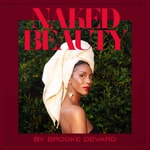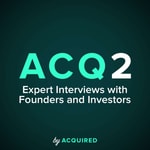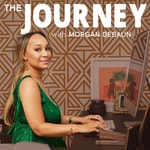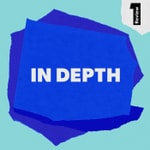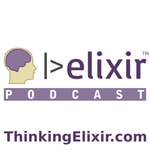The Creative Process · Arts, Culture & Society: Books, Film, Music, TV, Art, Writing, Creativity, Education, Environment, Th – Details, episodes & analysis
Podcast details
Technical and general information from the podcast's RSS feed.
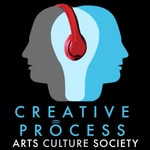
The Creative Process · Arts, Culture & Society: Books, Film, Music, TV, Art, Writing, Creativity, Education, Environment, Th
The Creative Process - Books, Film, Music, TV, Art, Writing, Education, Environment, Theatre, Dance, LGBTQ, Social Justice, Spirituality, Feminism, Technology, AI
Frequency: 1 episode/2d. Total Eps: 1161

Exploring the fascinating minds of creative people. Conversations with writers, artists and creative thinkers across the Arts and STEM. We discuss their life, work and artistic practice. Winners of Oscar, Emmy, Tony, Pulitzer, Nobel Prize, leaders and public figures share real experiences and offer valuable insights. Notable guests and participating museums and organizations include: Academy of Motion Picture Arts and Sciences, Neil Patrick Harris, Smithsonian, Roxane Gay, Musée Picasso, EARTHDAY-ORG, Neil Gaiman, UNESCO, Joyce Carol Oates, Mark Seliger, Acropolis Museum, Hilary Mantel, Songwriters Hall of Fame, George Saunders, The New Museum, Lemony Snicket, Pritzker Architecture Prize, Hans-Ulrich Obrist, Serpentine Galleries, Joe Mantegna, PETA, Greenpeace, EPA, Morgan Library and Museum, and many others.
The interviews are hosted by founder and creative educator Mia Funk with the participation of students, universities, and collaborators from around the world. These conversations are also part of our traveling exhibition.
Recent rankings
Latest chart positions across Apple Podcasts and Spotify rankings.
Apple Podcasts
🇬🇧 Great Britain - performingArts
28/07/2025#49🇫🇷 France - performingArts
28/07/2025#16🇫🇷 France - performingArts
27/07/2025#9🇺🇸 USA - performingArts
24/07/2025#79🇺🇸 USA - performingArts
23/07/2025#72🇬🇧 Great Britain - performingArts
21/07/2025#75🇬🇧 Great Britain - performingArts
20/07/2025#35🇺🇸 USA - performingArts
19/07/2025#91🇨🇦 Canada - performingArts
18/07/2025#85🇬🇧 Great Britain - performingArts
18/07/2025#79
Spotify
No recent rankings available
Shared links between episodes and podcasts
Links found in episode descriptions and other podcasts that share them.
See all- http://www.creativeprocess.info
4801 shares
- http://www.oneplanetpodcast.org
4152 shares
- https://studiorichtermahr.com
247 shares
- https://twitter.com/palumboliu?s=20
270 shares
- https://twitter.com/mroth78
44 shares
- https://twitter.com/dfenton?lang=en
22 shares
RSS feed quality and score
Technical evaluation of the podcast's RSS feed quality and structure.
See allScore global : 63%
Publication history
Monthly episode publishing history over the past years.
Wetlands, Methane & Restoring Earth’s Garden of Eden with EUAN NISBET
Season 8
lundi 2 septembre 2024 • Duration 45:47
Have we entered what Earth scientists call a “termination event,” and what can we do to avoid the worst outcomes? How can a spiritual connection to nature guide us toward better environmental stewardship? What can ancient wisdom teach us about living harmoniously with the Earth? How have wetlands become both crucial carbon sinks and colossal methane emitters in a warming world?
Euan Nisbet is an Emeritus Professor of Earth Sciences at the Royal Holloway University of London. Specializing in methane and its impact on climate change, his research spans Arctic and Tropical Atmospheric Methane budgets. Nisbet led the MOYA project, focusing on global methane emissions using aircraft and ground-based field campaigns in Africa and South America. Born in Germany and raised in Africa, his field work has taken him around the world. He is the author of The Young Earth and Leaving Eden: To Protect and Manage the Earth.
“I am a Christian and I have strong Muslim and Jewish friends as well as great respect for Hindu beliefs. I grew up in Southern Africa and I am well aware of the depth of some Indigenous beliefs. I think that having belief systems does give you a very different perspective sometimes. Now, in Christianity, the concept of the shepherd, human beings are here and this is our garden, our garden of Eden, but we have a responsibility. And if we choose to kick ourselves out of the garden, there are consequences. And that's precisely what we are doing. The garden is there, it's lovely, and we can manage it, and it's our job to manage it. We can manage it properly. We can respect it. It's for all creation, and it's very explicit that it involves all Creation. And that's a very fundamental biblical law that you have to respect all Creation. And if you don't do that, then the consequences—you’re basically throwing yourself out of the garden of Eden."
https://pure.royalholloway.ac.uk/en/persons/euan-nisbet
www.creativeprocess.info
www.oneplanetpodcast.org
IG www.instagram.com/creativeprocesspodcast
How can journalism make people care about crises & create solutions? - Highlights - NICHOLAS KRISTOF
Season 13
lundi 26 août 2024 • Duration 16:26
"I'm trying to get people to care about a crisis in ways that may bring solutions to it. And that's also how I deal with the terror and the fear to find a sense of purpose in what I do. It's incredibly heartbreaking to see some of the things and hear some of the stories, but at the end of the day, it feels like–inconsistently here and there–you can shine a light on problems, and by shining that light, you actually make a difference."
Nicholas D. Kristof is a two-time Pulitzer-winning journalist and Op-ed columnist for The New York Times, where he was previously bureau chief in Hong Kong, Beijing, and Tokyo. Kristof is a regular CNN contributor and has covered, among many other events and crises, the Tiananmen Square protests, the Darfur genocide, the Yemeni civil war, and the U.S. opioid crisis. He is the author of the memoir Chasing Hope, A Reporter's Life, and coauthor, with his wife, Sheryl WuDunn, of five previous books: Tightrope, A Path Appears, Half the Sky, Thunder from the East, and China Wakes.
Family vineyard & apple orchard in Yamhill, Oregon: www.kristoffarms.com
www.creativeprocess.info
www.oneplanetpodcast.org
IG www.instagram.com/creativeprocesspodcast
Climate Change, Mental Health & Fighting for a Better Future - Highlights - CHARLIE HERTZOG YOUNG
Season 13
vendredi 19 juillet 2024 • Duration 17:28
“I've been a climate activist since I was about 12 years old. It began with a deep passion for wildlife. I started taking up litter and telling off my schoolmates, eventually I set up a green council when I was about 13 or 14. As I learned more and more about the climate crisis and how sprawling and interconnected it was, not just with nature, but with the oppression that exists within human society, I started getting more involved and impassioned, getting involved in protests, marches. When I was about 15 years old, I helped shut down an airport for a night. I eventually started going to the UN climate talks. I went to Davos and it started to become my everything. I felt like I was doing something meaningful about the crisis, but also felt a sense of deep despair and loss, both from the perspective of the impending collapse of the biosphere and also a deep dislocation from the dominant culture and the consensus reality. I felt like no one else was feeling the sense of urgency and emergency that I felt. I started to get incredibly anxious. In 2019, when I was 27, I jumped off a six storey building. My memory has blacked it out, but I spent a month in a coma and woke up having lost both of my legs. The five years since have been one of not just physical and mental recovery, but also trying to untangle the messy web of causality as to how and why it was that I lost my mind in the way I did. I try to find some of the gifts in that madness, what it was pointing towards in terms of the unbalance of the ecosphere and how human civilization has begun to operate completely out of step with the ecosphere.”
Charlie Hertzog Young is a researcher, writer and award-winning activist. He identifies as a “proudly mad bipolar double amputee” and has worked for the New Economics Foundation, the Royal Society of Arts, the Good Law Project, the Four Day Week Campaign and the Centre for Progressive Change, as well as the UK Labour Party under three consecutive leaders. Charlie has spoken at the LSE, the UN and the World Economic Forum. He studied at Harvard, SOAS and Schumacher College and has written for The Ecologist, The Independent, Novara Media, Open Democracy and The Guardian. He is the author of Spinning Out: Climate Change, Mental Health and Fighting for a Better Future.
https://charliehertzogyoung.me
https://footnotepress.com/books/spinning-out/
www.creativeprocess.info
www.oneplanetpodcast.org
IG www.instagram.com/creativeprocesspodcast
How can we improve animal-human relationships? - Highlights - POORVA JOSHIPURA
Season 12
mercredi 7 février 2024 • Duration 10:14
"I wrote Survival at Stake because I've been working in animal rights for nearly the past 25 years. Throughout that time, one common question has been asked: Well, shouldn't we deal with human issues first. But animal rights are human rights. Animal rights is environmentalism. These things are not distinct. And that's the point I was really trying to make in my book. I was inspired to write it because of the COVID-19 crisis. It just brings us back to the point of why it is so important to teach people, young people, and young men the importance of being kind to everyone, animals included. If you teach them that, I think the other lessons start to much more automatically transfer over."
Poorva Joshipura is PETA U.K. Senior Vice President. She is the Author of Survival at Stake: How Our Treatment of Animals is Key to Human Existence and For a Moment of Taste: How What You Eat Impacts Animals, the Planet and Your Health.
www.harpercollins.com/products/for-a-moment-of-taste-poorva-joshipura?variant=39399505592354
www.creativeprocess.info
www.oneplanetpodcast.org
IG www.instagram.com/creativeprocesspodcast
POORVA JOSHIPURA - Senior VP, PETA UK - Author of Survival at Stake: How Our Treatment of Animals is Key to Human Existence
Season 12
mercredi 7 février 2024 • Duration 36:01
How can we improve animal-human relationships? How can we increase our sensitivity to the other animals who share this planet with us?
Poorva Joshipura is PETA U.K. Senior Vice President. She is the Author of Survival at Stake: How Our Treatment of Animals is Key to Human Existence and For a Moment of Taste: How What You Eat Impacts Animals, the Planet and Your Health.
"I wrote Survival at Stake because I've been working in animal rights for nearly the past 25 years. Throughout that time, one common question has been asked: Well, shouldn't we deal with human issues first. But animal rights are human rights. Animal rights is environmentalism. These things are not distinct. And that's the point I was really trying to make in my book. I was inspired to write it because of the COVID-19 crisis. It just brings us back to the point of why it is so important to teach people, young people, and young men the importance of being kind to everyone, animals included. If you teach them that, I think the other lessons start to much more automatically transfer over."
www.harpercollins.com/products/for-a-moment-of-taste-poorva-joshipura?variant=39399505592354
www.creativeprocess.info
www.oneplanetpodcast.org
IG www.instagram.com/creativeprocesspodcast
How can the arts help cultivate our intuitive intelligence? - Highlights - JONATHAN YEO
Season 12
lundi 5 février 2024 • Duration 12:19
"What are you trying to do with the portrait? On a basic level, you're trying to communicate something about the essence of who someone is. You're trying to figure out who they are, not necessarily who they present themselves as. The two things can quite often be different. And then, you're trying to find ways of showing that through their face, their posture, or any other context. My instinct is always to try to reduce down to the essential elements. We read faces. It's obviously very, very deep in our DNA, really our survival instinct. We are programmed to read faces in a very fine-tuned way.
Painting is a two-dimensional thing. You're basically taking real, three-dimensional things and making them into fake, two-dimensional ones. When you get into the 3D space, some of those distinctions aren't there anymore. I remember when I showed David Hockney the VR project I'd been working on a few years ago, and he put his finger on this quite well. Most art is about perspective. Certainly, for what he is interested in. As soon as you see something in 3D, whether it's a physical sculpture or a virtual object, that's not there anymore because you're in the space with whatever's being shown, so you're in a very different place."
Jonathan Yeo is one of the world’s leading figurative artists and portrait painters. From celebrated figures such as Sir David Attenborough, peace activist Malala Yousafzai, the Duke of Edinburgh, Nicole Kidman, and Tony Blair, sitting for a portrait with Yeo is a provisional necessity for any 21st century icon. His work, which has been exhibited in museums and galleries around the world, is the subject of several major mid-career retrospectives in the UK and internationally. Yeo’s course on portrait painting is available now on BBC Maestro.
www.jonathanyeo.com
www.bbcmaestro.com
www.creativeprocess.info
www.oneplanetpodcast.org
IG www.instagram.com/creativeprocesspodcast
Images courtesy of Jonathan Yeo
JONATHAN YEO - Celebrated Portrait Artist on the Importance of Connection & Intuitive Intelligence
Season 12
lundi 5 février 2024 • Duration 47:28
How can the arts help cultivate our intuitive intelligence? What does visual art teach us about consciousness and the human condition?
Jonathan Yeo is one of the world’s leading figurative artists and portrait painters. From celebrated figures such as Sir David Attenborough, peace activist Malala Yousafzai, the Duke of Edinburgh, Nicole Kidman, and Tony Blair, sitting for a portrait with Yeo is a provisional necessity for any 21st century icon. His work, which has been exhibited in museums and galleries around the world, is the subject of several major mid-career retrospectives in the UK and internationally. Yeo’s course on portrait painting is available now on BBC Maestro.
"What are you trying to do with the portrait? On a basic level, you're trying to communicate something about the essence of who someone is. You're trying to figure out who they are, not necessarily who they present themselves as. The two things can quite often be different. And then, you're trying to find ways of showing that through their face, their posture, or any other context. My instinct is always to try to reduce down to the essential elements. We read faces. It's obviously very, very deep in our DNA, really our survival instinct. We are programmed to read faces in a very fine-tuned way.
Painting is a two-dimensional thing. You're basically taking real, three-dimensional things and making them into fake, two-dimensional ones. When you get into the 3D space, some of those distinctions aren't there anymore. I remember when I showed David Hockney the VR project I'd been working on a few years ago, and he put his finger on this quite well. Most art is about perspective. Certainly, for what he is interested in. As soon as you see something in 3D, whether it's a physical sculpture or a virtual object, that's not there anymore because you're in the space with whatever's being shown, so you're in a very different place."
www.jonathanyeo.com
www.bbcmaestro.com
www.creativeprocess.info
www.oneplanetpodcast.org
IG www.instagram.com/creativeprocesspodcast
Images courtesy of Jonathan Yeo
How has our biology shaped world history? - Highlights - LEWIS DARTNELL
Season 12
samedi 3 février 2024 • Duration 13:13
"The challenges facing our society at the moment effectively are the unintended consequence of a solution we found in the late 1700s when society was running out of energy, we had no more timber, and we realized we could dig underground for ancient fossilized woodland, which is basically what coal is from about 300 million years ago. The consequence of burning all that coal and then oil was a release of carbon dioxide, changing our atmosphere and warming the planet. So, it's a problem born out of our ingenuity and resourcefulness, but I'm confident that we will find the solution out of our ingenuity and resourcefulness."
How have our psychology and cognitive biases altered the course of human history? What would you do if you had to rebuild our world from scratch?
Lewis Dartnell is an author, researcher, and holds the Professorship in Science Communication at the University of Westminster. He researches astrobiology and the search for microbial life on Mars. He also works as a scientific consultant for the media and has appeared in numerous TV documentaries and radio shows. Dr. Dartnell has won several awards for his science writing and outreach work. He has published five books, including The Knowledge: How to Rebuild our World from Scratch; Origins: How the Earth Made Us; and Being Human: How Our Biology Shaped World History.
http://www.lewisdartnell.com
http://lewisdartnell.com/en-gb/2013/11/the-knowledge-how-to-rebuild-our-world-from-scratch
www.penguin.co.uk/books/433955/origins-by-lewis-dartnell/9781784705435
www.penguin.co.uk/books/442759/being-human-by-dartnell-lewis/9781847926708
www.creativeprocess.info
www.oneplanetpodcast.org
IG www.instagram.com/creativeprocesspodcast
Photo credit: Shortlist/Paul Stuart
LEWIS DARTNELL - Author of Origins: How the Earth Made Us & Being Human: How Our Biology Shaped World History
Season 12
samedi 3 février 2024 • Duration 46:09
How have our psychology and cognitive biases altered the course of human history? What would you do if you had to rebuild our world from scratch?
Lewis Dartnell is an author, researcher, and holds the Professorship in Science Communication at the University of Westminster. He researches astrobiology and the search for microbial life on Mars. He also works as a scientific consultant for the media and has appeared in numerous TV documentaries and radio shows. Dr. Dartnell has won several awards for his science writing and outreach work. He has published five books, including The Knowledge: How to Rebuild our World from Scratch; Origins: How the Earth Made Us; and Being Human: How Our Biology Shaped World History.
"The challenges facing our society at the moment effectively are the unintended consequence of a solution we found in the late 1700s when society was running out of energy, we had no more timber, and we realized we could dig underground for ancient fossilized woodland, which is basically what coal is from about 300 million years ago. The consequence of burning all that coal and then oil was a release of carbon dioxide, changing our atmosphere and warming the planet. So, it's a problem born out of our ingenuity and resourcefulness, but I'm confident that we will find the solution out of our ingenuity and resourcefulness."
http://www.lewisdartnell.com
http://lewisdartnell.com/en-gb/2013/11/the-knowledge-how-to-rebuild-our-world-from-scratch
www.penguin.co.uk/books/433955/origins-by-lewis-dartnell/9781784705435
www.penguin.co.uk/books/442759/being-human-by-dartnell-lewis/9781847926708
www.creativeprocess.info
www.oneplanetpodcast.org
IG www.instagram.com/creativeprocesspodcast
Photo credit: Shortlist/Paul Stuart
How can we develop AI systems that are more respectful, ethical, and sustainable? - Highlights - DR. SASHA LUCCIONI
Season 12
mercredi 31 janvier 2024 • Duration 12:25
"The way I got into this field was working on the environmentally beneficial applications of AI, and I do believe that that's an impactful way of using AI techniques because there's so much data about the climate, satellite data, and sensor data, and the way to go about this is to work with domain experts. AI is never going to solve the problem on its own, but it can be a tool. So I think that there's a lot of promise there."
What are the pros and cons of AI’s integration into our institutions, political systems, culture, and society? How can we develop AI systems that are more respectful, ethical, and sustainable?
Dr. Sasha Luccioni is a leading scientist at the nexus of artificial intelligence, ethics, and sustainability, with a Ph.D. in AI and a decade of research and industry expertise. She spearheads research, consults, and utilizes capacity-building to elevate the sustainability of AI systems. As a founding member of Climate Change AI (CCAI) and a board member of Women in Machine Learning (WiML), Sasha is passionate about catalyzing impactful change, organizing events, and serving as a mentor to under-represented minorities within the AI community. She is an AI Researcher & Climate Lead at Hugging Face, an open-source hub for machine learning and natural language processing.
https://www.sashaluccioni.com
https://huggingface.co/
http://www.climatechange.ai
https://wimlworkshop.org

